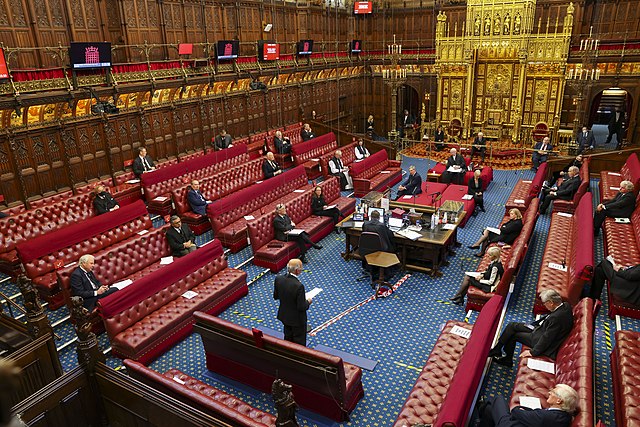Secondary Legislation Scrutiny Committee draws special attention to Statement of Changes in Immigration Rules (HC 733)
In a report published today, the House of Lords Secondary Legislation Scrutiny Committee has drawn special attention to the recent statement of changes to the Immigration Rules (HC 733) and its impact on care workers.
 Image credit: WikipediaThe Committee focuses on the statement's significant policy change requiring care providers in England to prioritise hiring from a pool of care workers who previously arrived on care worker visas but are no longer employed. This measure aims to help these workers secure new jobs while encouraging care providers to make use of an experienced and readily available workforce.
Image credit: WikipediaThe Committee focuses on the statement's significant policy change requiring care providers in England to prioritise hiring from a pool of care workers who previously arrived on care worker visas but are no longer employed. This measure aims to help these workers secure new jobs while encouraging care providers to make use of an experienced and readily available workforce.
Explaining the need for the new policy, the Home Office stated that "too many providers have recruited care workers to the UK and failed to provide them with the work they were promised, or have subjected them to appalling exploitation." Some providers—described by the Home Office as "bad actors"—have engaged in serious abuses, including debt bondage and modern slavery. As a result, many care workers have been left without employment due to sponsors being unable to offer sufficient work or having their licences revoked for unacceptable practices.
The scale of the problem is significant. The Home Office confirmed to the Committee that more than 39,000 care workers had been affected by sponsor revocations up to December 2024, though the department was unable to provide an overall estimate of the number of care workers currently without sponsorship.
Concerns have been raised that many workers in this pool have been subjected to exploitation and are currently facing adverse conditions such as homelessness and destitution. In a submission to the Secondary Legislation Scrutiny Committee, the Work Rights Centre referred to the situation as a "national crisis".
The Committee noted that the success of the Government's new policy depends on the effectiveness of 'regional partnerships' established to match unemployed care workers with potential employers. While the Government has stated its commitment to improving these partnerships, the Work Rights Centre believes the new policy "is not going to make any material difference".
A survey cited in the Work Rights Centre's submission indicated that 73% of affected workers were unaware of the 'rematching scheme'. Furthermore, data obtained through a Freedom of Information request suggested that only 6% of 7,048 care workers who contacted the partnerships between 1 July 2024 and 21 January 2025 had been supported into new employment.
The Secondary Legislation Scrutiny Committee put these concerns to the Home Office, which agreed that the new policy would not fully resolve the challenges facing displaced care workers. The Home Office stated that it is exploring additional ways to support affected workers and is "doing all it can to raise awareness."
The Home Office said: "UKVI have written to all care workers who have been affected by the revocation of a sponsor licence. These letters ensure the worker is aware of their sponsor's revocation and encourages them to seek advice. They include contact details for the regional partnerships that the worker should contact in order to seek assistance in finding a new employer."
In addition, £16 million has been allocated in 2024/25 to regional partnerships to help prevent exploitation in the sector and support international recruits in understanding their rights. Despite previous outreach efforts, the Home Office noted that engagement with the regional partnerships has been limited, which prompted the introduction of the new requirement for care providers to consider displaced workers before hiring from overseas.
A further concern raised by the Work Rights Centre in its submission is the 60-day limit imposed on care workers who lose their sponsorship. Officially, they have just 60 days from the point of Home Office notification to secure new sponsored employment or make arrangements to leave the UK. The Work Rights Centre describes this timeframe as "almost never long enough" to find a new sponsor, particularly given the complexities of the immigration system. While it is acknowledged that immigration officials may delay visa curtailment in practice, the lack of a formal written policy leaves affected workers in an uncertain and precarious position.
In response, the Home Office defended the 60-day limit as a necessary balance between giving workers time to find new sponsorship and ensuring compliance with immigration rules. It also pointed out that the sponsor register is publicly available for workers to search. The Home Office further noted that the 60-day period was originally designed to include time for a now-defunct Resident Labour Market Test but has remained unchanged since the test was abolished in 2020.
Highlighting several unresolved concerns regarding the new policy, the Committee suggests that the Lords may wish to question the Government on what steps the Home Office is taking to obtain more accurate data on the number of care workers who have lost sponsorship. Additionally, the Committee recommends scrutiny of how the Home Office will monitor and report on the policy's effectiveness, as well as what further measures it is considering to both assess the true scale of the issue and improve the number of affected workers successfully supported into new employment.
The Committee stated in concluding: "We are not in a position to pre-judge the impact of the policy. However, we welcome that the Government recognises the changes 'will not entirely solve the challenges facing displaced care workers', and that there are barriers to the operation of the matching scheme. It is also encouraging that the Home Office has committed to 'continue to explore further ways' of supporting those in the pool."